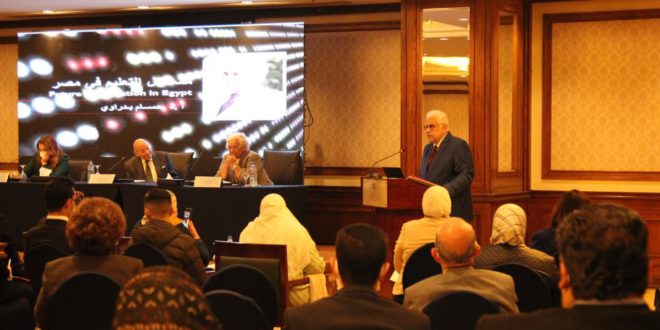At the invitation of the National Council for Human Rights, Professor Hossam Badrawi gave an important speech today about the future of education in light of the challenges of the Corona epidemic
Workshop “Education between Reality and Hope”; Organized by the National Council for Human Rights; With the aim of discussing the reality of Egyptian education and its problems, and the challenges it faces in light of the Corona virus pandemic, and to come up with recommendations to improve the educational process.
The workshop was inaugurated by Mohamed Fayek, President of the National Council for Human Rights, with the participation of Nevin Massad, a member of the Council, Nadia Gamal El-Din, Professor of Education at Cairo University, Dr. Yasser Abdel Aziz, a member of the Council, Dr. Sami Nassar, an educational expert, and Iman Raslan, a journalist specializing in education affairs. Dr. Randa Shaheen
Muhammad Faeq, head of the National Council for Human Rights, revealed that the council is currently working on completing its project to review school curricula from a human rights perspective, which aims to purify textbooks of what may contradict these rights, hoping to raise a generation that is fully aware of their correct values, with the aim of developing Curricula as a main tool for establishing human rights values and spreading their culture
While Dr. Badrawi stressed during his speech that work should be done within the framework of Egypt’s Vision 2030, which includes all aspects so that we all work under the umbrella of this vision
The vision includes 5 axes that apply to technical education as well as to general education:
1- Availability without discrimination for all ages
2- Governance of public administration, and governance of educational administration
3- digital
4- Building the integrated personality of the student
5- Competitiveness of graduates
Dr. Badrawi also stressed the importance of sustainability and building on what has been achieved previously, as many previous efforts have been made that should be completed and their results taken into consideration.
Workshop “Education between Reality and Hope”; Organized by the National Council for Human Rights; With the aim of discussing the reality of Egyptian education and its problems, and the challenges it faces in light of the Corona virus pandemic, and to come up with recommendations to improve the educational process.
The workshop was inaugurated by Mohamed Fayek, President of the National Council for Human Rights, with the participation of Nevin Massad, a member of the Council, Nadia Gamal El-Din, Professor of Education at Cairo University, Dr. Yasser Abdel Aziz, a member of the Council, Dr. Sami Nassar, an educational expert, and Iman Raslan, a journalist specializing in education affairs. Dr. Randa Shaheen
Muhammad Faeq, head of the National Council for Human Rights, revealed that the council is currently working on completing its project to review school curricula from a human rights perspective, which aims to purify textbooks of what may contradict these rights, hoping to raise a generation that is fully aware of their correct values, with the aim of developing Curricula as a main tool for establishing human rights values and spreading their culture
While Dr. Badrawi stressed during his speech that work should be done within the framework of Egypt’s Vision 2030, which includes all aspects so that we all work under the umbrella of this vision
The vision includes 5 axes that apply to technical education as well as to general education:
1- Availability without discrimination for all ages
2- Governance of public administration, and governance of educational administration
3- digital
4- Building the integrated personality of the student
5- Competitiveness of graduates
Dr. Badrawi also stressed the importance of sustainability and building on what has been achieved previously, as many previous efforts have been made that should be completed and their results taken into consideration.
 Dr. Hossam Badrawi Official Website
Dr. Hossam Badrawi Official Website


